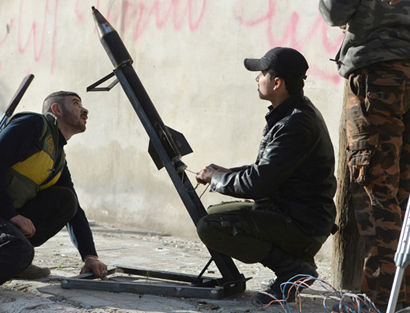The European Union agreed on Monday to ease its oil embargo on opposition-controlled parts of Syria, in a gesture of support for the rebels fighting to oust President Bashar al-Assad, dpa reported.
The decision, made by the bloc's foreign ministers during talks in Luxembourg, does not affect the EU arms embargo on the war-torn country.
The move is aimed at "meeting humanitarian concerns, restoring normal life, upholding basic services, reconstruction, and restoring normal economic activity," according to conclusions related at the talks.
The easing of sanctions is to affect "measures concerning the oil import ban, the export ban on key equipment and technology for key sectors of the oil and natural gas industry in Syria and the investment ban on the Syrian oil industry."
Britain, along with France, has been calling for the EU to partially lift its arms embargo in order to back the forces opposing al-Assad.
"The world isn't doing enough," said British Foreign Secretary William Hague. "The world has failed so far in its responsibilities to the Syrian population."
"I do think that the whole of the EU we will have to do more to support the opposition," Hague said, adding that Britain was already supplying the opposition with items such as body armour, bulletproof vehicles and communication equipment.
But in a step signalling disappointment at the world's handling of Syria's conflict, Moaz al-Khatib has reportedly insisted on stepping down as head of the opposition Syrian National Coalition.
George Sabra, the coalition's vice president, is to lead the grouping until a new head is elected next month.
The new opposition caretaker chief warned Monday that the Lebanese Shiite Hezbollah movement was launching a war against the Syrian people.
"What's happening (in the Syrian central province of Homs) is a declaration of war against the Syrian people and the Lebanese government and president must realize how dangerous this is," Sabra said at a press conference in Istanbul.
"Syrians will not be tolerant with any group occupying their land, be it Lebanese or non-Lebanese," he said.
Syrian activists and opposition figures have accused the pro-Iranian Hezbollah of fighting alongside government troops inside Syria.
Shortly after Sabra's declaration, Lebanese Sunni Muslim extremist Sheikh Ahmad al Assir announced the formation of "The Resistance Brigade" to protect the Sunnis in Syria's al-Kussair region, near the border with Lebanon.
There are around 30,000 Lebanese Shiites living in a cluster of Syrian villages near the Lebanese border, according to activists.
Al-Kusair is also crucial for both warring sides due to its proximity to a highway linking the Syrian capital Damascus and the central province of Homs.
Opposition rebels retreated Monday from parts of al-Kussair after an onslaught by the Syrian army, said activists.
"Regime forces backed by Lebanese Shiite militant groups have taken control of several areas in al-Kussair," Rami Abdel Rahman, the head of the Syrian Observatory for Human Rights, said.
Meanwhile, the number of the people killed in an offensive by government troops in the town of Jadidat al Fadl, south-west of the Damascus, has risen to 110, according to the Britain-based observatory.
The Local Coordination Committees, a network of opposition activists, however reported that 475 people had been killed in the town after five days of fighting between al-Assad's troops and rebels.
Elsewhere, activists reported Monday that Bishops Boulos al-Yaziji and Yuhanna Ibrahim were kidnapped in the northern Syrian province of Aleppo while their driver was killed. There were no further details.
Embattled President al-Assad on Sunday renewed his vow not to relent in fighting against what he called "militants and terrorists."
"No appeasement can be pursued with the militant and terrorist groups," al-Assad was quoted by Syria's official news agency as telling a delegation of Lebanese politicians in Damascus.
Damascus has repeatedly described the rebels fighting to overthrow al-Assad as "terrorists" financed by foreign powers.
Al-Assad said the situation in Syria was improving due to what he called "Syrians' steadfastness and their rallying around their valiant army."
At least 70,000 people have been killed in Syria since a popular revolt against al-Assad started in March 2011, according to UN estimates.






